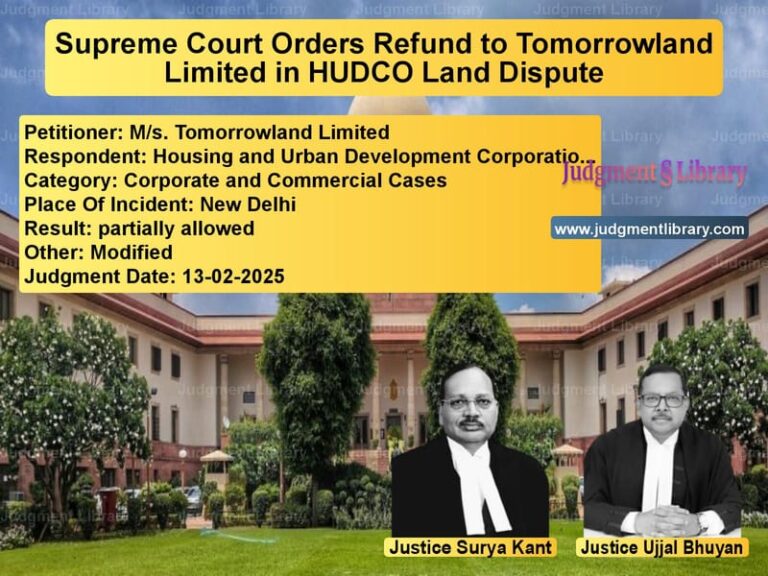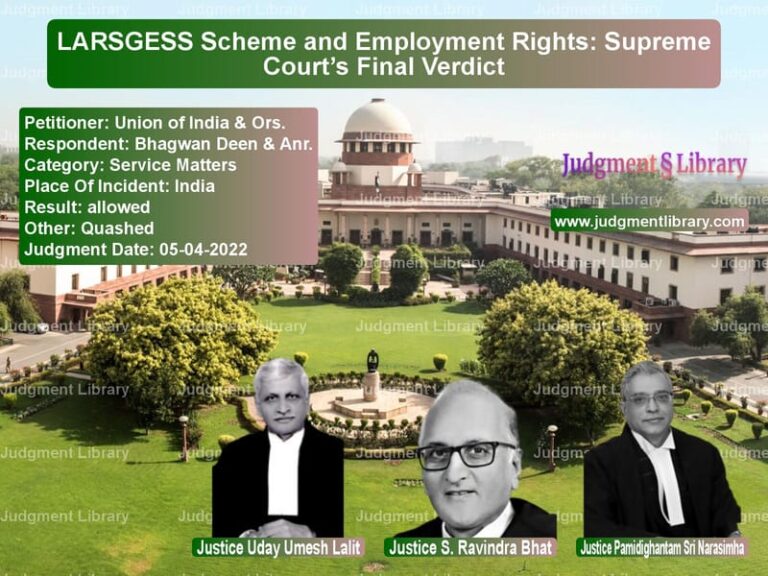Odisha Forest Development Corporation vs. Anupam Traders: Supreme Court Rules on Kendu Leaf Auction Dispute
The Supreme Court of India, in the case of Odisha Forest Development Corporation Ltd. (OFDC) vs. M/s Anupam Traders & Others, delivered a significant ruling concerning the auction and contractual obligations related to the sale of Kendu leaves in Odisha. The case revolved around the cancellation of agreements with private bidders and the subsequent re-auctioning of lots at the cost and risk of the initial bidders.
Background of the Case
The dispute arose when OFDC Ltd. issued an e-tender notification on November 22, 2016, inviting offers for the advance sale of Phal Kendu leaves for the 2017 crop year. The respondents participated in the bidding process and successfully secured contracts. However, as per the tender agreement, they were required to deposit a provisional security deposit of ₹5,00,000 and later submit an additional security deposit covering 25% of the purchase price.
The respondents failed to deposit the required security amount before the stipulated deadline of May 31, 2017. Consequently, OFDC canceled their agreements and initiated a fresh auction on August 22, 2017. The respondents challenged the cancellation before the Odisha High Court.
High Court Proceedings
The High Court issued an interim order allowing the auction process but staying its finalization, subject to the respondents depositing specific amounts with OFDC. Subsequently, the High Court permitted the respondents to withdraw their writ petitions but directed OFDC to refund the deposited amounts.
Petitioners’ (OFDC) Arguments
- The High Court erred in directing the refund of deposits made pursuant to its interim order.
- The respondents failed to comply with the contractual obligation to pay the additional security deposit.
- The agreements explicitly provided that in case of default, the security deposit would be forfeited and any financial loss due to re-auctioning would be recoverable from the original bidders.
- Since the re-auction was conducted at the respondents’ risk, OFDC had the right to assess and recover the financial losses incurred.
Respondents’ Arguments
- The amounts deposited were not part of the contractual security deposit but were made as a condition imposed by the High Court for interim relief.
- The High Court rightly directed the refund since the writ petitions were withdrawn without a ruling on the merits.
- The forfeiture clause in the agreement did not apply as the deposits were made under a court order, not as part of the contractual terms.
Supreme Court’s Judgment
The Supreme Court set aside the High Court’s direction to refund the deposits, ruling that:
1. Deposits Were Conditional
- The amounts deposited by the respondents were a conditional security mechanism imposed by the High Court.
- The Court ruled:
“A conditional deposit, imposed to safeguard the appellant’s interest during litigation, cannot be treated as an amount refundable by default.”
2. Financial Losses Must Be Assessed
- Since the re-auction was conducted at the respondents’ cost and risk, OFDC was entitled to assess financial losses incurred due to their default.
- The Court ruled:
“The amount deposited must be adjusted against financial losses suffered by OFDC before any refund is considered.”
3. Right to Recover Damages
- The agreement allowed OFDC to forfeit the security deposit and recover additional losses from defaulting bidders.
- The Supreme Court ruled:
“OFDC retains the right to assess the financial impact and recover the differential amount through legal proceedings.”
4. Conditional Refund
- The Supreme Court ruled that the deposited amount should be retained until a proper loss assessment is completed.
- If the losses suffered by OFDC were less than the deposit amount, the balance should be refunded.
- If the losses were higher, OFDC had the right to initiate legal proceedings for recovery.
Impact of the Judgment
This ruling has significant implications for commercial contracts and government tenders:
- Strengthens Government Rights in Auctions: Ensures that bidders who default on contractual obligations cannot evade financial consequences.
- Establishes a Framework for Risk-Based Auctions: Holds bidders accountable for financial losses arising from contract terminations.
- Clarifies Legal Treatment of Court-Ordered Deposits: Distinguishes between contractual security deposits and court-imposed conditions in interim orders.
Conclusion
The Supreme Court’s ruling in Odisha Forest Development Corporation Ltd. vs. M/s Anupam Traders & Others reinforces the principle that contractual obligations must be strictly adhered to. The judgment prevents bidders from escaping liability by defaulting on their commitments and sets a precedent for handling financial losses in government auctions.
Petitioner Name: Odisha Forest Development Corporation Ltd..Respondent Name: M/s Anupam Traders & Others.Judgment By: Justice A.S. Bopanna, Justice R. Banumathi, Justice Hrishikesh Roy.Place Of Incident: Odisha.Judgment Date: 28-11-2019.
Don’t miss out on the full details! Download the complete judgment in PDF format below and gain valuable insights instantly!
Download Judgment: Odisha Forest Develo vs Ms Anupam Traders & Supreme Court of India Judgment Dated 28-11-2019.pdf
Direct Downlaod Judgment: Direct downlaod this Judgment
See all petitions in Contract Disputes
See all petitions in unfair trade practices
See all petitions in Corporate Compliance
See all petitions in Judgment by A. S. Bopanna
See all petitions in Judgment by R. Banumathi
See all petitions in Judgment by Hrishikesh Roy
See all petitions in allowed
See all petitions in Quashed
See all petitions in supreme court of India judgments November 2019
See all petitions in 2019 judgments
See all posts in Corporate and Commercial Cases Category
See all allowed petitions in Corporate and Commercial Cases Category
See all Dismissed petitions in Corporate and Commercial Cases Category
See all partially allowed petitions in Corporate and Commercial Cases Category







